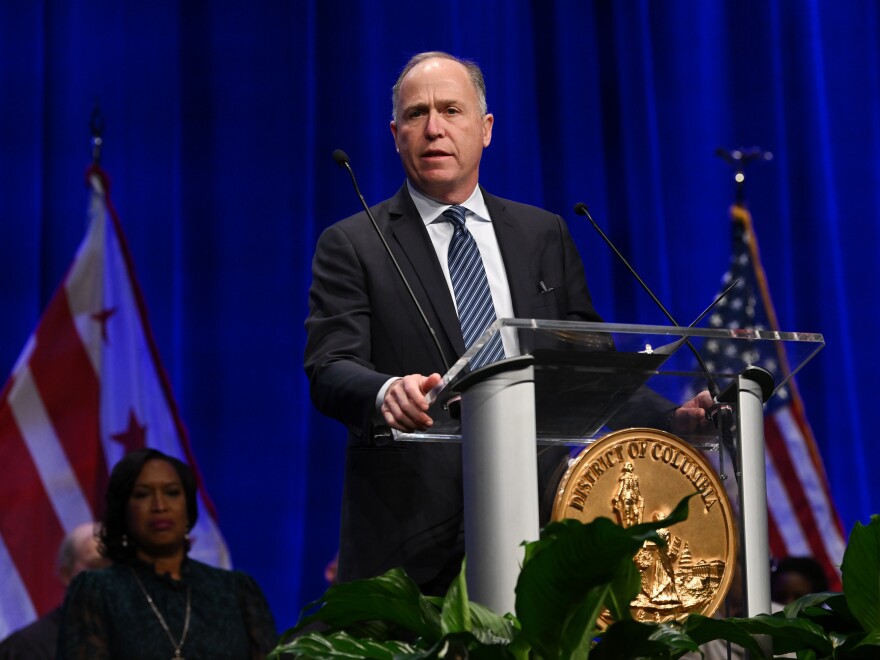Updated @ 5:24 PM EDT on August 15, 2025
Washington After the Attorney General of Washington, D.C., filed a federal lawsuit contesting the White House’s desire for complete authority, tensions in the nation’s capital increased on Friday over who oversees the city’s metropolitan police force.
AG Brian Schwalb stated in his court brief that “the District will suffer immediate, catastrophic, and irreversible harms as a result of these unlawful assertions of authority.” “Most critically, the order threatens to upend the command structure of MPD and wreak operational havoc within the department, endangering the safety of the public and law enforcement officers alike.”
Schwalb claimed late Friday that he had won a court battle when federal representatives consented to give Metropolitan Police Chief Pamela Smith day-to-day command of the MPD, at least for the time being.
“We hope we don’t have to be back here in court again,” he stated. Schwalb declined to describe the backstage discussions that took place with the Trump administration over the past 24 hours while speaking outside the courthouse on Constitution Avenue.
It was obvious that local officials were having difficulty averting this type of conflict. Mayor Muriel Bowser indicated that the city’s executives will follow White House instructions in order to comply with the emergency declaration when President Trump announced on Monday that he was requesting authority over law enforcement in Washington, D.C.
However, Bowser and Chief Smith maintained that they would continue to have operational control.
U.S. Attorney General Pam Bondi then precipitated this most recent escalation late Thursday when she moved to name a “emergency police commissioner,” assigning Terry Cole, the top officer at the Drug Enforcement Administration, to the position.
Bondi’s directive stated that “Commissioner Cole shall assume all of the powers and duties vested in the District of Columbia Chief of Police.”
Even though the city’s violent crime rate has dropped to a 30-year low, Trump said this week that the city may turn into a “wasteland.”
“Our capital city has been overtaken by violent gangs and bloodthirsty criminals, roving mobs of wild youth, drugged-out maniacs and homeless people,” Trump stated.
According to the federal lawsuit Schwalb filed on Friday, Trump’s broad assertion of federal authority over local police is blatantly against DC’s Home Rule charter, which was created by Congress. He has requested an injunction from the federal court to stop the power play by the Trump administration.
Using a social media statementBondi’s request for complete control over law enforcement was likewise turned down by Mayor Bowser on Thursday.
“In reference to the U.S. Attorney General’s order, there is no statute that conveys the District’s personnel authority to a federal official,” Bowser stated.
Let’s be clear about what the law requires in the event of a presidential emergency: upon the president’s request, the mayor of Washington, DC, must offer the Metropolitan Police Department’s services for federal reasons.We have complied with the law.XfaNqLalFU inpic.twitter.com
Meanwhile, a number of experts characterized the dispute over the city’s local police power as a high-stakes public safety issue and a dangerous moment for U.S. democracy.
Rosa Brooks, a former reserve police officer with the Washington, D.C. Metropolitan Police Department who currently researches policing policy at Georgetown Law School, stated, “I’m at about an 11.5 on a concern scale of zero to ten.”
“It’s unprecedented and really frightening. “The symbolic part of it, this is police state territory,” she continued, pointing out that Trump has proposed giving other American communities a comparable amount of federal control over law enforcement.
According to Brooks, police and the public are immediately concerned about public safety due to a lack of clarity regarding the accountability of MPD officers.
It’s actually rather risky, in my opinion. A situation is extremely dangerous when there are several armed individuals around and it’s unclear who is in command of what,” Brooks stated.
To find out how the tension is impacting officers, NPR contacted representatives of the District of Columbia Police Union. They still haven’t replied.
Trump stated on Monday that local police under federal authority would behave far more forcefully and would have authorization from administration officials to do “whatever the hell they want.” This court battle over operational control follows his statement.
Copyright 2025 NPR






